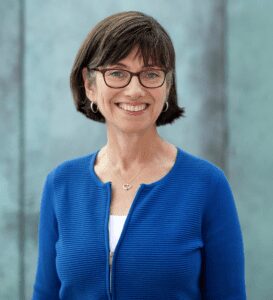5 Questions with the Senior Associate Dean of MBA Programs at BU Questrom

In our latest installment of the MetroMBA “5 Questions” series, we speak with Barbara Bickart, the Senior Associate Dean of MBA Programs at Boston University’s Questrom School of Business. Bickart talks about the qualities MBA candidates possess, unique opportunities for MBA students, and things to do in Boston.
1. Why should an MBA candidate be excited to apply to Questrom?
“I believe three main factors make our program unique.
First, Questrom has a strategic focus on three sectors that we have identified as drivers of growth in our economy—digital technology, health, and social impact. We have developed unique program offerings as well as vibrant communities around these three sectors, and many of our students participate in one of these programs.
Second, our program is designed so that students can obtain a deep base of functional knowledge and key skills, and start their elective courses in the first year. Our first year is divided into four, seven-week modules. In the first three modules, students take three classes and complete an integrated experiential project. For example, in Mod 3, students take Strategy, Information Systems, and Organizational Behavior while working on a client-based project that addresses strategic issues in one of our three sectors. Through this process, students learn to view and solve problems from a multi-disciplinary perspective. Students can start taking elective courses during Mod 4.

Barbara Bickart is an Associate Professor of Marketing and Senior Associate Dean for MBA Programs.
Finally, Boston is a great place for students studying business, with a vibrant culture around innovation and technology. Our project-based learning draws on the Boston eco-system, and many of our students end up working in Boston or the immediate area.”
2. What type of MBA candidate is the best fit for Questrom?
“Our students come from a variety of backgrounds and experiences. In addition to being smart, intellectually curious, and engaged, the two traits that I would say best characterize our students are that (a) they care about community and the impact of their work on society and (b) they are agile and creative—they are flexible in how they think about and solve problems and look outside the box for solutions.”
3. How does Questrom stay on the cutting edge of MBA education? Is there a unique feature you can highlight?
“We are constantly evaluating and updating our curriculum, with a particular focus on adding more experiential learning opportunities in our courses and co-curricular experiences. Our faculty’s research often drives our elective courses. For example, one of our most popular elective courses is Platform Strategy. This course was developed by Professor Marshall Van Alstyne and is based on his book Platform Revolution: How Networked Markets are Transforming the Economy and How to Make the Work for You (2016, W.W. Norton and Co). In this course, student teams work on consulting projects for major platform-based companies. Past projects have been sponsored by Airbnb, Allstate, Capgemini, eBay, edX, Jawbone, Haier, Huawei, Mahindra, Pearson, PGA, PTC, Siemens, SAP, startups, and many others.”
4. What unique opportunities outside of the MBA curriculum make Questrom stand out?
“Our student community is active and engaged—there is always something going on here at Questrom. Students take advantage of the Boston ecosystem—attending networking events and conferences, for example, in health and life sciences. Questrom students are also involved Innovate@BU, which is a BU-wide initiative supporting student-led innovation and entrepreneurial activities. Students take advantage of the Build Lab IDG Capital Student Innovation Center, which is an on-campus co-working space for collaboration and new ventures. The Questrom School of Business Internship Fund provides financial support our students interested in exploring internships at not-for-profits. Finally, we offer a number to global learning opportunities, both in our curriculum and via student-run trips. Groups travel to Paris to study luxury marketing, South Africa to study social impact, Israel to study entrepreneurship, Vietnam to study manufacturing, and Silicon Valley to learn more about digital technology.”

“The views of Cambridge and Boston are amazing. I particularly love walking along the Charles during the Head of the Charles rowing races in October,” Bickart says.
5. What’s your favorite activity in Boston? Why?
“My favorite activity in Boston is to walk along paths on the Charles River. From my office, it takes just a few minutes to get to this path. The views of Cambridge and Boston are amazing. I particularly love walking along the Charles during the Head of the Charles rowing races in October. The races are exciting and fun to watch, and there is a lot of energy in the crowd.”
Henley Business School To Begin New Huawei Certification Program

The Henley Business School at the University of Reading in London has announced a new program in partnership with TECH Education Group, an education provider in the technology field. The new Information Communications Technology (ICT) Master’s and Huawei Certification program helps solidify the school’s tech-centric offerings.
This addition makes Henley the school the first in Europe to offer “expert-level Huawei certification,” according to a press release. Starting in September 2018, students in the MSc Information Management and MSc Business Technology Consulting courses will begin taking new modules to work toward the Huawei certification, which will take one year. The new curriculum will include modules that will allow students to graduate with certifications as a Huawei Certified Network Associate (HCNA), Network Professional (HCNP), and Internet Expert (HCIE).
“In this digital age in which topics such as big data, data security, and digital innovation are highly relevant, there is an increasing need for talent with a firm understanding of both business and technology in developing innovative and creative solutions,” Professor Keiichi Nakata said in the release. “This new partnership with TECH Education Group is ideally timed to enhance our existing collaboration with Huawei to supply industry-ready talent for businesses around the world, as well as providing a boost to professionals as they enter the job market.”
This certification is highly recognized in the industry. More than 140 countries have acknowledged the certification. It’s sure to stay up to date as the ICT sector evolves and merges closely with other similar sectors like computing and mobile broadband, according to its website.
Interested students can begin applying for the program later this year until August 2018.
“This partnership marks a continuation of our efforts in educating and nurturing experts who are equipped with the knowledge to deal with the complexities of an increasingly digital and data-orientated business world,” TECH Education Group CEO Kangping Lin said in the release. “We need reliable and talented professionals to help move society forward towards a better-connected world and students completing this pathway will finish their study ready to excel in their field.”
Last July, Huawei became the world’s second largest smartphone manufacturing company, surpassing Apple. The Chinese telecommunications giant currently owns more than 10 percent of the global smartphone market, thanks in part to a deeply diverse manufacturing catalog, according to Counterpoint Research data.
